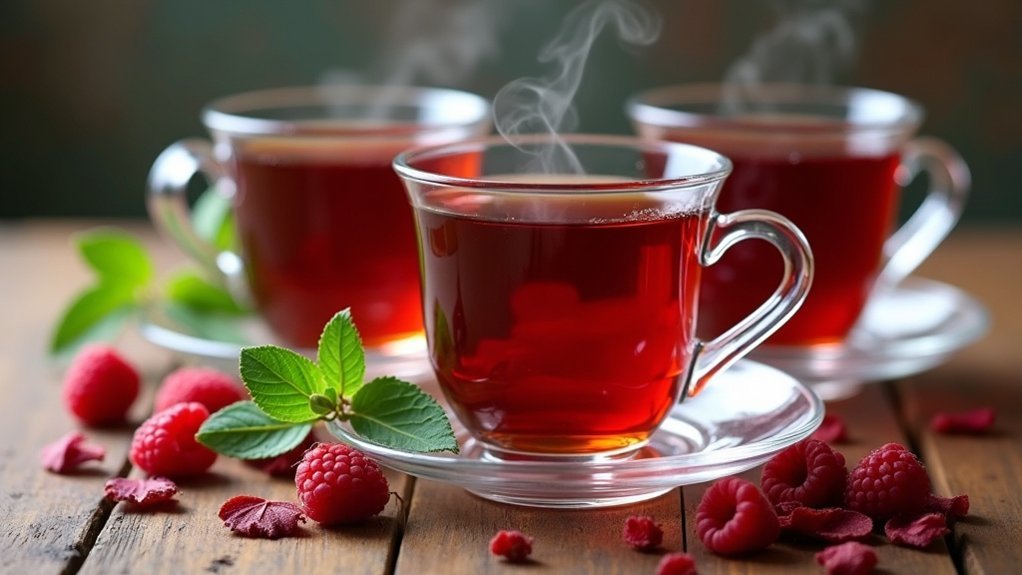You’ve probably heard whispers about red raspberry leaf tea’s reputation for supporting women’s reproductive health, but with countless options flooding the market, you’re left wondering which ones actually deliver on their promises. While herbalists consistently recommend this ancient remedy for everything from hormone balance to menstrual comfort, the quality and potency vary dramatically between brands. Three specific teas have earned the trust of reproductive health experts for their proven effectiveness and superior formulations.
Red Raspberry Leaf Tea Organic – Loose Raspberry Leaves (2 Ounces)
If you’re seeking USDA organic certification with maximum potency, this hand-picked Red Raspberry Leaf Tea from Ukraine delivers exceptional quality for women’s reproductive health. Harvested before fruit development in ecologically clean areas, these loose leaves contain high levels of vitamins, minerals, flavonoids, and tannins that support healthy hormones and alleviate menstrual discomfort. You’ll get exceptional value with two ounces filling six 64-ounce jars. Users report improved blood pressure, better sleep, and reduced stress levels. Your purchase also supports Ukrainian workers’ families during challenging times, making this both a health-conscious and socially responsible choice.
Best For: Women seeking natural support for reproductive health, menstrual comfort, and hormonal balance who prefer organic, high-potency herbal teas.
Pros:
- USDA organic certification with hand-picked leaves harvested at optimal potency from ecologically clean areas
- Exceptional value with 2 ounces providing enough tea to fill six 64-ounce jars
- Multiple reported health benefits including improved blood pressure, better sleep, and stress reduction
Cons:
- Some users report strong, unpleasant odors that may be off-putting
- Concerns about value for money compared to alternative purchasing options
- Requires proper storage techniques with deoxidizing packets and vacuum sealing for maximum freshness
Organic Fertility Tea for Women w Red Raspberry Leaf (15 Pyramid Sachets)
Women actively trying to conceive will find exceptional value in this Organic Fertility Tea for Women, which combines red raspberry leaf with five other carefully selected herbs in premium pyramid sachets. You’ll benefit from cinnamon and spearmint for hormone support, nettle leaf for essential vitamins, chamomile for calming effects, and red clover for healthy circulation. The biodegradable pyramid sachets won’t release microplastics into your tea, ensuring you’re getting pure, USDA Organic ingredients. You can brew it without sweeteners since it naturally tastes pleasant, or drink it cold throughout the day for maximum benefits.
Best For: Women actively trying to conceive who want a natural, organic herbal tea blend to support hormonal balance and reproductive health.
Pros:
- Contains six carefully selected organic herbs including red raspberry leaf, cinnamon, and nettle leaf for comprehensive fertility support
- Made with biodegradable pyramid sachets that prevent microplastics from entering your beverage
- Pleasant natural taste that can be enjoyed hot or cold without added sweeteners
Cons:
- Some users have reported price increases making it less affordable over time
- Packaging may arrive damaged during shipping
- Limited to 15 sachets per box which may not last long for daily users
Yogi Raspberry Leaf Tea – Organic Caffeine Free Tea Bags (4 Packs)
Yogi’s organic raspberry leaf tea stands out as an excellent choice for health-conscious women seeking natural reproductive support without compromising on quality or environmental values. You’ll appreciate the USDA organic, non-GMO raspberry leaves that create a pure tea experience while supporting hormone balance and alleviating menstrual cramps. Each purchase includes four packs with 16 compostable tea bags per box, giving you 64 servings total. The microplastic-free, eco-friendly packaging aligns with sustainable living practices. Yogi’s commitment to high-quality botanicals and unique flavor profiles makes this caffeine-free option perfect for daily reproductive wellness support.
Best For: Women seeking natural, organic herbal tea to support reproductive health, hormone balance, and menstrual comfort while maintaining eco-friendly lifestyle choices.
Pros:
- USDA organic, non-GMO raspberry leaves with compostable, microplastic-free tea bags for environmentally conscious consumers
- Specifically formulated to support hormone balance, alleviate menstrual cramps, and promote reproductive wellness in women
- Generous 4-pack bundle provides 64 total servings of caffeine-free tea suitable for daily consumption
Cons:
- Limited to female-specific health benefits, making it less versatile for general household use
- Herbal tea effects may vary significantly between individuals and lack standardized dosing
- Higher cost per serving compared to conventional non-organic tea options
Factors to Consider When Choosing Red Raspberry Leaf Teas for Reproductive Health
When selecting red raspberry leaf tea for reproductive health, you’ll want to prioritize organic certification standards that guarantee the absence of harmful pesticides and chemicals. Consider how the leaves are sourced, harvested, processed, and dried, as these factors directly impact the tea’s potency and therapeutic benefits. You should also evaluate packaging formats and ingredient purity levels to find a product that meets your specific needs and quality expectations.
Organic Certification Standards
Purity matters greatly when selecting red raspberry leaf tea for reproductive health support. You’ll want to look for teas with organic certification, which guarantees products are grown without synthetic pesticides, herbicides, or fertilizers. The USDA Organic label confirms you’re getting tea with at least 95% organic ingredients that’s undergone rigorous inspections throughout the supply chain.
Organic farming practices enhance soil health and biodiversity, resulting in more potent and nutrient-rich red raspberry leaves. You can trust that certified organic teas contain no genetically modified organisms, providing a cleaner product for your reproductive health needs. The certification process involves strict compliance checks, so you’re confident the tea maintains organic standards from cultivation to packaging, promoting both environmental sustainability and your health.
Sourcing and Harvesting
Beyond certification standards, the location and timing of sourcing directly impact your tea’s therapeutic value. You’ll want raspberry leaves harvested from ecologically clean areas, free from industrial pollutants and environmental contaminants that could compromise the herb’s purity.
Timing matters greatly for potency. Look for leaves harvested before fruit development, when nutrient concentrations peak and therapeutic compounds remain most concentrated. This pre-fruiting window guarantees you’re getting maximum health benefits from each cup.
Hand-picking methods indicate quality sourcing, as they minimize plant damage and guarantee only prime leaves make it into your tea blend. You should also verify that proper drying techniques were used to preserve nutrients during processing and storage, maintaining the leaf’s reproductive health benefits.
Processing and Drying
Three critical processing stages determine whether your red raspberry leaf tea retains its reproductive health benefits or loses potency during production. First, timing matters most—you’ll want leaves harvested before fruit development when vitamin and mineral concentrations peak. Second, proper drying techniques preserve essential flavonoids and compounds that support healthy hormone levels. Heat damage during processing destroys these delicate nutrients, so look for air-dried or low-temperature methods. Third, storage quality affects long-term potency. Choose brands using vacuum sealing and deoxidizing packets to prevent oxidation. The processing form also impacts effectiveness—loose leaf teas typically allow better compound extraction during brewing compared to pre-bagged options, giving you maximum reproductive wellness benefits.
Packaging Format Options
When you’re selecting red raspberry leaf tea for reproductive health, the packaging format greatly impacts both potency and convenience. Loose leaf options give you greater control over brew strength and typically maintain longer shelf life when stored properly. You’ll get maximum potency from loose leaves, which is essential for therapeutic benefits.
Pyramid sachets offer convenience while allowing tea leaves adequate space to expand and release their active compounds. They’re perfect if you want quality without the measuring hassle.
Traditional tea bags provide the most portable option and often come in eco-friendly packaging. However, consider environmental impact when choosing—some contain microplastics while others use biodegradable materials. Factor in ease of use, freshness retention, and your brewing preferences when deciding.
Ingredient Purity Levels
Since reproductive health requires the purest compounds possible, you’ll want to prioritize red raspberry leaf teas with the highest ingredient purity levels. USDA Organic certification guarantees your tea’s free from synthetic pesticides and fertilizers that could interfere with reproductive wellness. Pure, high-quality leaves contain essential vitamins, minerals, and flavonoids that support hormonal balance effectively.
You’ll get maximum potency from teas using hand-picked raspberry leaves harvested at prime times, as freshness directly impacts efficacy. Look for complete ingredient transparency—brands should clearly list all components, including additional herbs that might enhance or compromise purity. Choose products with eco-friendly packaging, which often reflects a company’s commitment to quality and sustainability while preventing contamination during storage.
Potency and Concentration
Although many factors influence red raspberry leaf tea’s effectiveness, potency and concentration stand as the most critical elements for reproductive health benefits. You’ll find the highest concentrations of beneficial compounds in leaves harvested before fruit development, when the plant directs its energy into leaf production rather than berry formation.
Your tea’s potency depends heavily on growing conditions and processing methods, which can dramatically alter vitamin, mineral, and flavonoid levels. Choose loose leaf varieties over bagged options since whole leaves retain more natural oils and nutrients that contribute to therapeutic effects.
Consider blends containing multiple beneficial herbs, as they often work synergistically to enhance reproductive support. Prioritize freshness by selecting teas with deoxidizing packets or vacuum sealing to preserve active compounds over time.
Storage and Freshness
The longevity of your red raspberry leaf tea’s therapeutic benefits hinges entirely on how you store it after purchase. You’ll want to keep your tea in a cool, dark, and dry environment to prevent moisture and light exposure from degrading its quality. Use deoxidizing packets and vacuum-sealing jars to maintain peak freshness and potency over time.
When properly stored, loose leaf raspberry tea offers exceptional value—just 2 ounces can fill six 64-ounce glass mason jars. You’ll know your tea remains fresh by its vibrant color and aromatic scent; any strong odors indicate spoilage. For best efficacy, consider using an electric herb grinder for individual doses, preserving the leaves’ freshness until you’re ready to brew.
Frequently Asked Questions
How Long Does It Take to See Reproductive Health Benefits From Red Raspberry Leaf Tea?
You’ll typically notice reproductive health benefits from red raspberry leaf tea after 4-6 weeks of consistent daily consumption. However, some women report changes within 2-3 weeks, while others need 2-3 months.
Can Red Raspberry Leaf Tea Interfere With Birth Control or Fertility Medications?
You should consult your healthcare provider before drinking red raspberry leaf tea with birth control or fertility medications. While there’s limited research on interactions, herbal supplements can potentially affect hormone levels and medication effectiveness.
What’s the Difference Between Red Raspberry Leaf Tea and Regular Raspberry Tea?
You’re comparing two different plant parts. Red raspberry leaf tea uses only the leaves of the raspberry plant, while regular raspberry tea typically contains actual raspberry fruit pieces or flavoring for taste.
Is It Safe to Drink Red Raspberry Leaf Tea During Early Pregnancy?
You shouldn’t drink red raspberry leaf tea during early pregnancy without consulting your healthcare provider first. Most herbalists recommend waiting until the second or third trimester due to potential uterine stimulation risks.
How Many Cups of Red Raspberry Leaf Tea Should I Drink Daily?
You’ll want to start with one cup daily during your second trimester, then gradually increase to two or three cups in your third trimester. Don’t exceed three cups daily.





Leave a Reply